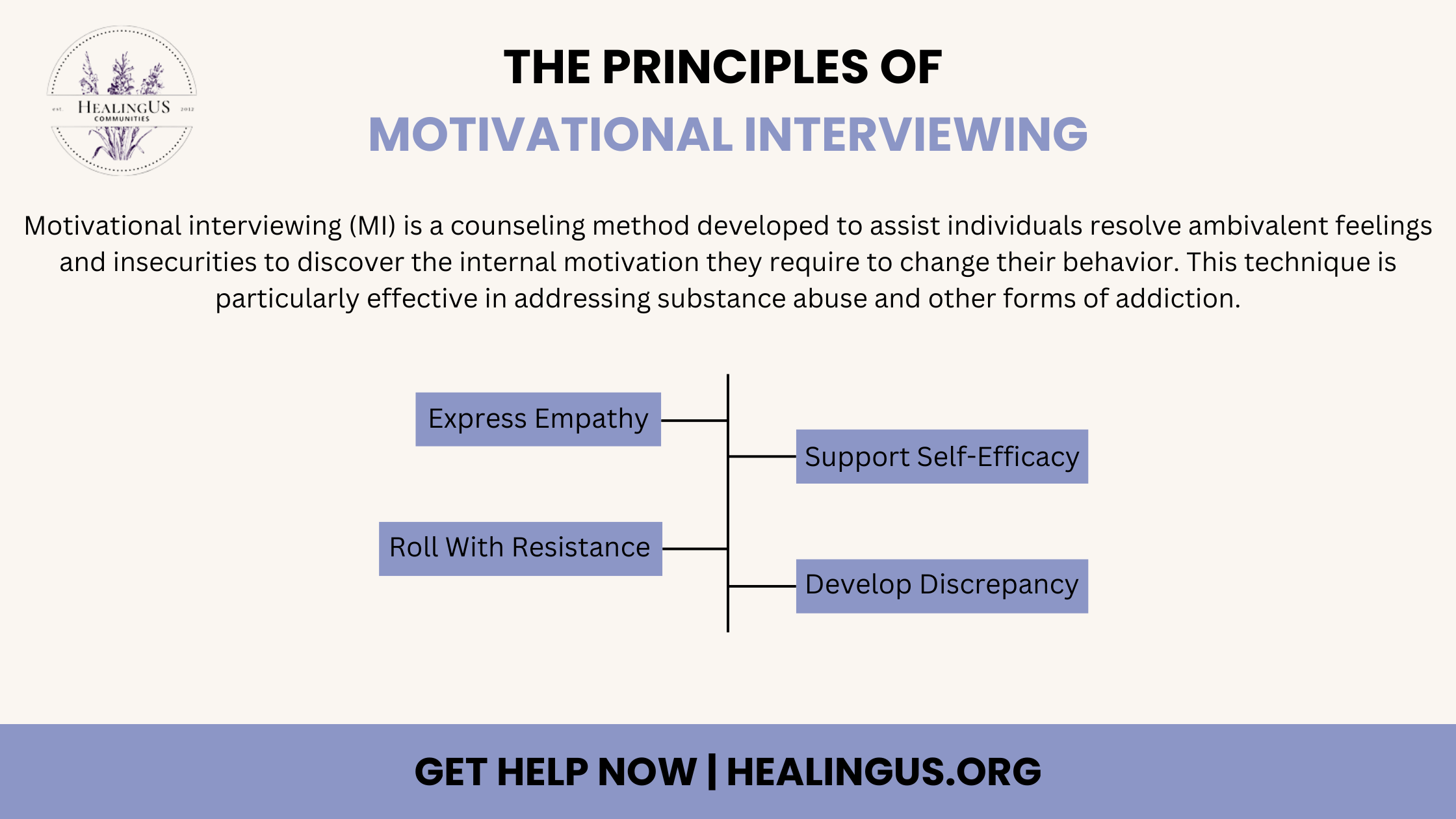More than 76 million people around the world struggle with alcohol issues, and around 15 million have drug problems. Motivational interviewing (MI) is a psychological treatment that helps people reduce or quit using drugs and alcohol.
Motivational interviewing for substance abuse is a powerful, client-centered approach. It helps individuals overcome addiction by exploring their intrinsic motivations.
This blog delves into the essentials of motivational interviewing, its history, working mechanisms, principles, strategies, goals, and its critical role in addiction and mental health treatment.
What Is Motivational Interviewing (MI)?
Motivational interviewing (MI) is a counseling method developed to assist individuals resolve ambivalent feelings and insecurities to discover the internal motivation they require to change their behavior. This technique is particularly effective in addressing substance abuse and other forms of addiction.
Unlike traditional confrontational methods, MI is empathetic and non-judgmental, focusing on increasing the client’s motivation to change by exploring and resolving ambivalence.
History of Motivational Interviewing
Motivational interviewing was first created by Dr. William R. Miller in 1983 from his work with people who had drinking problems. In the 1990s, Dr. Miller and Dr. Stephen Rollnick developed the approach further, adding various psychological principles. The method’s success in treating alcoholism led to its use in other areas like substance abuse, mental health, and managing chronic illnesses.
How Motivational Interviewing Works
Motivational interviewing for substance abuse focuses on the idea that people with addiction often experience ambivalence towards change. MI addresses this ambivalence through a conversation between the therapist and the individual.
The therapist helps the person express their reasons for wanting to change, which strengthens their commitment. MI uses open-ended questions, reflective listening, and positive feedback to build trust and create a safe space for exploring thoughts and feelings about change.
Principles of Motivational Interviewing
Motivational interviewing operates on four key principles:

- Express Empathy: Understanding the client’s perspective through reflective listening creates a non-judgmental environment that fosters trust and openness.
- Develop Discrepancy: Helping clients identify the gap between their existing behaviors and their wider goals or values can encourage them to change.
- Roll with Resistance: Rather than confronting resistance directly, MI practitioners use it as a tool to understand the client’s viewpoint and explore new perspectives.
- Support Self-Efficacy: Inspiring clients to believe in their capability to change is essential. By backing their strengths and past successes, therapists help build the client’s confidence in their ability for change.
Motivational Interviewing Strategies
Several strategies are employed in motivational interviewing for substance abuse:
1. OARS Technique:
- Open-ended Questions: These questions encourage clients to express their thoughts and feelings in detail, facilitating deeper exploration of their motivations.
- Affirmations: Praising the client’s strengths and efforts boosts their confidence and motivation.
- Reflective Listening: Therapists repeat the client’s words to show understanding and help clients hear their reasons for change.
- Summarizing: Summarizing key points of the conversation reinforces what was discussed and clarifies the client’s reasons and plans for change.
2. Elicit-Provide-Elicit (EPE)
This strategy involves understanding the client’s current perspective and any misconceptions they might have. For example, a therapist might ask, “What do you know about the effects of alcohol on your health?”
After understanding the client’s perspective, the therapist shares new information or feedback. For example, the therapist might say, “Research indicates that heavy drinking can lead to intense health issues like liver disease and high blood pressure.”
Finally, the therapist asks the client for their thoughts and feelings about the new information. This encourages the client to reflect on what they’ve learned and consider how it applies to their situation.
This process engages clients in a collaborative conversation about their behavior and potential changes.
3. Decisional Balance
This strategy applies considering the pros and cons of change versus staying the same, helping clients imagine the advantages of change and the drawbacks of their present behavior.
Goals of Motivational Interviewing
The primary goals of motivational interviewing for substance abuse are:
- Enhancing Motivation: MI helps clients find their motivation for change by exploring and resolving ambivalence,
- Strengthening Commitment: Through collaborative conversations, clients become more committed to their recovery journey.
- Supporting Behavior Change: MI provides clients with the tools and confidence to make and sustain positive life changes.
- Promoting Autonomy: MI respects the client’s autonomy, empowering them to take control of their recovery process.
Motivational Interviewing in Addiction and Mental Health Treatment
Motivational interviewing for substance abuse has proven to be highly effective in addiction treatment settings. It is often integrated into broader treatment plans, complementing other therapeutic approaches like cognitive-behavioral therapy (CBT) and contingency management.
The results based on 59 studies showed that people who received motivational interviewing (MI) reduced their substance use more effectively than those without any treatment.
MI is particularly useful in the early stages of treatment when clients may still be ambivalent about change. By addressing this ambivalence, MI sets the foundation for successful long-term recovery.
In mental health treatment, MI helps individuals with co-occurring disorders (substance abuse and mental health issues) by fostering motivation and self-efficacy. It encourages clients to engage actively in their treatment, improving outcomes and reducing the likelihood of relapse.
FAQs
Que: What makes motivational interviewing different from other counseling techniques?
Ans: Motivational interviewing is unique because it is client-centered and non-confrontational. It focuses on exploring and resolving ambivalence rather than directly challenging the client’s behavior.
Que: How long does motivational interviewing take to be effective?
Ans: The duration of MI can vary. Some clients may experience significant breakthroughs in a few sessions, while others may require longer engagement. The key is the quality of the interaction rather than the quantity of sessions.
Que: Can motivational interviewing be used in group settings?
Ans: Yes, MI can be adapted for group settings. Group MI sessions can provide additional support and motivation through shared experiences and collective encouragement.
Que: Is motivational interviewing only effective for substance abuse?
Ans: While MI is particularly effective for substance abuse, it is also beneficial for other areas such as mental health, chronic illness management, and lifestyle changes like diet and exercise.
Que: What qualifications do practitioners need to conduct motivational interviewing?
Ans: Practitioners typically undergo specialized training in MI. This training is often part of broader counseling or psychology education programs but can also be acquired through dedicated MI workshops and certification programs.
Conclusion
Mastering motivational interviewing for substance abuse healing requires understanding its principles, techniques, and goals. This empathetic, client-centered process empowers individuals to analyze their intrinsic motivations and devote themselves to positive changes.
As a versatile tool in addiction and mental health treatment, motivational interviewing fosters lasting recovery and enhances overall well-being. By embracing MI, practitioners can make a profound difference in the lives of those struggling with addiction, guiding them toward a healthier, more fulfilling future.
Ready to make a difference in addiction recovery? Learn how motivational interviewing at HealingUS can help individuals overcome addiction and build healthier futures.



